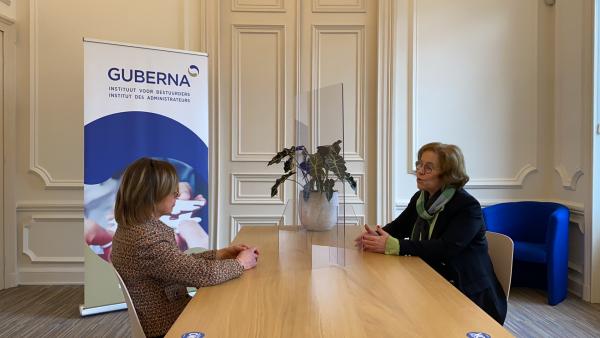GUBERNA Alumni Sparkles - Monique Lempereur


The vision of a female board director and CEO in the chemical industry
Monique Lempereur is a seasoned value creator in the chemical industry. As an experienced entrepreneur and director, she has a wealth of experience in developing globally new markets. She created Continental Carbon Europe where she had the opportunity to develop and implement its governance as a subsidiary of a listed Taiwanese company.
In the article below, she takes us through her rich experience and shows us good examples of the importance of agility and resilience as part of good governance.
Monique Lempereur
Board Member and Managing Director Continental Carbon Company Europe
Tel +32 471 11 40 44
email
Delighted to welcome you as a GUBERNA Certified Director, with experience both on boards of directors and on executive committee level. Could you give us a brief overview of your professional career?
Good morning Catherine! My name is Monique Lempereur. I have a master's degree in chemistry from the Université Libre de Bruxelles. So naturally I have spent my entire career in the chemical industry. I started in technical functions and then mainly evolved into global management roles in marketing and sales. 13 years ago, I have created my management company called Lempereur & Partners. In 2013, when I joined Continental Carbon, there was no activity in Europe, no legal structure yet nor a plant located in the region. I therefore had the opportunity to develop and set up the governance of Continental Carbon Europe. I am currently serving as Managing director of Continental Carbon Company Europe which I co-founded as a director. Continental Carbon Europe is a subsidiary of a Taiwanese group listed on the Taipei Stock Exchange. Today, the company markets carbon black, an additive which enhances the mechanical properties of tires, on four continents, mainly from a plant located in Saudi Arabia.
As part of your directorships in associations like FCE or EWoB, what were the main governance challenges you had to face?
Femmes Chefs d'Entreprises in Belgium is a network rooted in female entrepreneurship and EWOB's mission is to promote gender diversity on boards of directors. These two associations place an important emphasis on the principles of good governance.
The women who sit on the boards of directors of these associations all have a very active professional life. They devote part of their free time to carry out an unpaid mandate. They have to maximise the impact of their actions and this with limited human and financial resources. Efficiency can therefore be a challenge.

As president of a European association, you have been confronted with a diversity of cultures but also of governance styles specific to each country, which complicates this role of presidency: how did you experience it?
The national associations that were member of EWoB were all based in the European Union. There was therefore a common base on the principles of good governance.
On the other hand, the percentage of women who sat on boards of directors varied greatly from one country to another. Some countries have legislation in this area, others do not. Some programmes are therefore more interesting for some associations than for others. The creation of different committees is an interesting solution.
Today you are the CEO of Continental Carbon Europe, a subsidiary of Continental Carbon, a multinational listed on the Taipei Stock Exchange. As we can imagine, the decision-making process is quite complex and different from what we practice here. What are the governance mechanisms that have been put in place and are they working?
Continental Carbon is a company which, like many Asian corporations, has until recently operated in a regional manner. Consolidation at the global level was mainly done at the financial level. The name of the company was even different in South East Asia than in the rest of the world. For the past two years, the company has been headed by a new chairman and a more westernised governance has been developed. In terms of implementation, a global key account management process has been put in place. This is an important step because the tire industry we serve is dominated by global players. In Europe, I am thinking in particular of Michelin, Continental Tires and Pirelli, companies for which the world decision-making centres are in Europe.
According to your experience in the field, has the health crisis changed the way the board and the executive operate?
The COVID-19 crisis has indeed changed the way the board and the executive committees operate because we had to face and are still facing a totally new and unforeseen situation. The crisis has had a major impact on our industry. Plants had to shut down or at least reduce production sometimes for several months. Somewhat unexpectedly demand was very strong in the fourth quarter. Today the logistics industry is globally struggling to provide the containers for sea shipment cargoes and sea freight costs have skyrocketed in some regions.
The health crisis is accelerating the convergence of governance models as companies must act in a more agile way to quickly adapt to an unstable market that is also hardly predictable in the coming months.
A resilient mindset at board and executive levels are key.
What are the main challenges of a company like Continental Carbon Europe in today's VUCA world? How are ESG issues taken into account by the board?
The carbon black that we market on four continents is a chemical commodity.
It is a complex market as the competitive situation can be very different from one country to another and depends on several factors such as tariffs. We can respond to this complexity being flexible and creative.
The market in which we participate is also volatile. Prices fluctuate with oil prices and with the dollar exchange rates. These two key pricing components are beyond our control. We must therefore address this volatility with a medium and long-term vision and strategy.
Continental Carbon aims to be a pioneer in the circular economy. ESG criteria are therefore taken very seriously by the board and the other stakeholders. Commitment towards Sustainability is today a sine qua non requirement for our company to remain a leading player in the tire sector. Sustainability drives many of our customers globally and each year we are evaluated on our progresses towards Sustainability.
In our industry, Sustainability is no longer a “nice to have” but a “must have” criteria.
About the interviewer
Interview conducted by Catherine Delanghe
Engaged board member in various organisations
Tel +32 471 87 64 97
email
Want to contribute to GUBERNA Alumni Sparkles?
GUBERNA wants to be a true community in which each member can perform his/her role as director in the best conditions.
To encourage the exchange of experiences and knowledge, the GUBERNA Alumni have launched an interview series: GUBERNA Alumni Sparkles. Through the stories of experienced directors, we want to inspire our members.
Would you like to contribute to GUBERNA Alumni Sparkles or do you have suggestions for interviewees or topics? Please send an email to Danny Vandevyver.
